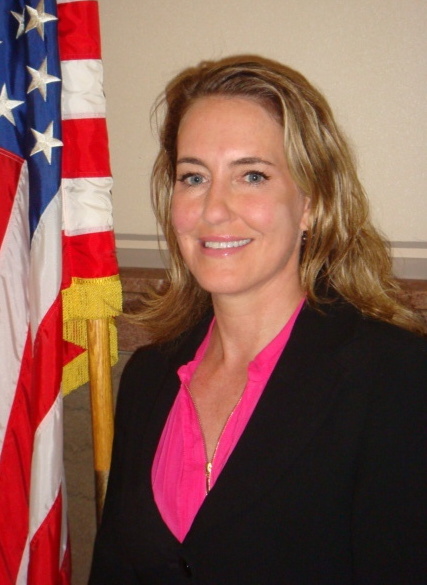MaryNell Regan on the Hot Seat
New head of embattled Fire & Police Commission wants to allow more community input into its decisions.
On September 1, the Milwaukee Common Council approved the appointment of MaryNell Regan as new executive director of Milwaukee’s Fire and Police Commission. The appointment had been made in late July by Mayor Tom Barrett, who said of Regan, “She knows the community. She’s well-respected.”
Odds are, given Barrett’s strong support of Milwaukee Police Chief Ed Flynn, that Regan is supportive as well. On the other hand, she has a background working on civil rights issues, and there has been criticism of both Flynn and the Fire and Police Commission for their handling of controversial cases involving suspects in police custody. The fatal shooting of Dontre Hamilton by a police officer has caused particular controversy. Regan sees a need to change the commission, but is still figuring precisely how to do that.
Milwaukee’s Fire and Police Commission was established in 1885 as a way to reduce direct political influence over the Fire and Police Departments – to create a buffer between elected officials and the departments in charge of public safety. “It was initially established so that mayors and politicians could not have a hand in selecting chiefs in protective services, because there was a lot of nepotism and favoritism,” Regan explains. “So we’re really supposed to be a very nonpolitical agency, and that’s one of my goals, to shield the commissioners from undue influence, and to keep politics out of the running of the Fire and Police Departments.”
Today, the FPC is said to be one of the most powerful civilian oversight boards in the country. It is in charge of recruitment for the police and fire departments, and has to approve all promotions within them. It handles disciplinary appeals for the two departments, investigates citizen complaints against police officers and firefighters, and also is in charge of disciplining fire and police employees found guilty of misconduct.
The board is comprised of seven part-time civilian commissioners and a full-time executive director, all appointed by the mayor. Currently, the commission includes women and men, some white, some Hispanic, and some African-American, and has representatives from fields including public health, housing, immigration law, and labor law. The executive director does not vote as a member of the board, and works to implement the initiatives of the commissioners, but can have tremendous power behind the scenes shaping and creating policies they adopt.
Regan grew up in southern Oregon, to parents working in the Public Health Service. Her parents met as students at Marquette University, and her father was a Milwaukee native. Hence, Regan spent her childhood summers in Milwaukee visiting her grandparents. When it came time to decide on a college, her grandmother tried to lure her back to Milwaukee by sending postcards that read, “Mount Mary! Or there’s Marquette.” However, Regan stayed in Oregon to attend Lewis and Clark College in Portland. After college, she decided to apply to law schools, and it was at that point that her grandmother’s campaigning prevailed. In 1991, she moved here to begin her studies at Marquette Law School.
As a law student at Marquette, Regan had the opportunity to clerk with the NAACP’s Legal Defense Fund and the American Civil Liberties Union (ACLU), who collaborated on a lawsuit against one of Wisconsin’s largest insurance companies, American Family, for redlining. The NAACP and ACLU collected stories from residents who moved from one zip code to another, and found that the insurance company was charging far higher rates in predominantly African-American districts. This triggered a class action lawsuit in federal court. “When I graduated from law school, they [the ACLU and NAACP] asked me to join as lawyer for one of the plaintiffs, until we settled the case through a consent decree. The U.S. Department of Justice joined us as plaintiffs, and Janet Reno came in… It was an exciting way to begin practicing law.”
After that, Regan decided to stay in Milwaukee and entered private practice, though it was mostly work for governments. “I represented mostly cities, counties, and municipalities on what is called 1983 or civil rights litigation, and did some employment law. But then I also did – because when you first start practicing law, you can really never say no to work – a lot of tort litigation, products liability, some premise liability, insurance defense, and insurance coverage. That’s where I really learned how to practice law.” Regan intentionally focused her career on public sector law. “My goal was always to do civil rights litigation, and then naturally I sort of veered towards employment law, because that’s sort of where all of the Equal Employment Opportunity issues were.”
After six years in private practice, Regan joined the Milwaukee City Attorney’s Office. She continued to focus on employment and civil rights law, and represented entities including the Police Department, the Fire Department, and the Milwaukee Board of School Directors. She also represented the police chief in disciplinary cases from 2000-2003. During her work at the City Attorney’s Office, Regan sometimes found herself arguing cases at the Seventh Circuit Federal Appeals Court in Chicago, but also interpreting state statutes, federal and state constitutional issues, and municipal ordinances. Her work was nothing if not varied.
One statute that became central to her work was Wisconsin Statute 62.50, which governs the Fire and Police Commission. “Some cases I’ve had that established precedent were mostly interpreting statute, and several interpreting 62.50. And that’s sort of what I highlighted in terms of applying for this position, is that I really understood 62.50, and had even created some good law defining the contours of 62.50.”
Regan speaks fervently about wanting to work collaboratively with the fire and police departments to increase public engagement and improve community relations. One way she hopes to do this is by promoting initiatives that connect youth to the police and fire departments. These include weekend volunteer programs for middle and high schoolers, where they get to spend an afternoon learning police and firefighting skills, and police and firefighter appearances at events like My Brother’s Keeper. Another promising avenue Regan cites are entry-level jobs for 17-19 year-olds with the departments, known as the Fire Cadet and Police Aid programs. The overarching goal of all of those youth initiatives, she says, is “to get the kids interested early, and then to see that these are great careers.”
Regan also hopes to engage the public by opening more meetings to public comments. “I have a plan to utilize the city’s Equal Rights Commission as a way to vet testimony from the public first, and then give us recommendations on what the public would like to hear at public meetings. For example, with the new body-camera [for all police], we’re in the midst of planning a public community session where everyone will have the ability to ask questions and make statements about how they feel about it, or clear up misperceptions. So that’s one of my goals, to have those kinds of meetings about specific issues.”
Her staff is also planning to open up one of the regular Thursday meetings to public reactions to the recently released 2014 Use-of-Force Report. “I know that everybody isn’t going to agree, but I want to have more of a presence in the community. I want people to know that they can send us questions, they can call our office. We want to hear from people, we want to take their complaints. We really want to be more collaborative.”
Regan hopes to revamp the citizen complaint process, which is a legacy of Tobin. Currently, complaints are divided into informal and formal complaints. “Right now, informal complaints are where we’ve received a phone call, there’s been some investigation, but the complainant doesn’t mail back a written form,” she explains. “When they mail back a written complaint, that makes it formal. I’d like to shake that up so that our investigators are following up with the informal. But sometimes people call, and they just want to vent, and then they don’t really want to fill out the form and mail it back. I want to be on the same page with the investigators and make sure we’re doing everything we can so that people are happy and feel that their issues are resolved. Because we’re really the only outside agency, separate from the Police and Fire Departments, that can field those kind of complaints.”
She also wants to reduce the administrative burden on the commission and on her staff, so they can focus their energy on the most pressing issues. Currently, one of the biggest jobs for the Fire and Police Commission staff is called testing, which is the process through which all fire and police employees are recruited and promoted. Her staff includes two human resource specialists who coordinate the written, physical, psychological and oral exams necessary for promotion within the departments. “They hear every single leave request, they hear every promotion – civilian and sworn. I think it’s important that they hear the sworn promotions, but when you’re talking about Building Mechanic 1 being promoted to a Building Mechanic 2, I think you could put that into one category where the commissioners could read everything before the meeting, and then vote to accept the whole agenda. It would shorten the meeting and allow more time for issues that are important to the public.”
But for now, Regan is still learning the ropes of her new position. “It is sort of non-stop on the run. It’s funny, because I came from 21 years of litigating, and I thought that was non-stop on the run. Except in that case, you’re reading case law, and applying facts, and you have it all set out. Here, it’s a lot of instinct, a lot of talking to people, trying to figure out what their problem is and what they need.”
In the short-term, she intends to do as much listening as possible. “In giving people a forum to talk, I heard so many great thoughts and ideas on how we could fix things, and some solutions, and you get a sense of what’s on people’s minds and what they’re worrying about. That’s my goal: to be more collaborative.”
Political Contributions Tracker
Displaying political contributions between people mentioned in this story. Learn more.
- May 25, 2017 - Tom Barrett received $500 from MaryNell Regan
- March 3, 2016 - Tom Barrett received $500 from MaryNell Regan
Profile
-
How Victor Amaya Became a Data Wonk
 Jul 13th, 2022 by PrincessSafiya Byers
Jul 13th, 2022 by PrincessSafiya Byers
-
A Life In Photographs
 May 12th, 2017 by Gabrielle Barriere
May 12th, 2017 by Gabrielle Barriere
-
The Musical Journey of Jay Anderson
 Jul 30th, 2015 by Joey Grihalva
Jul 30th, 2015 by Joey Grihalva

















